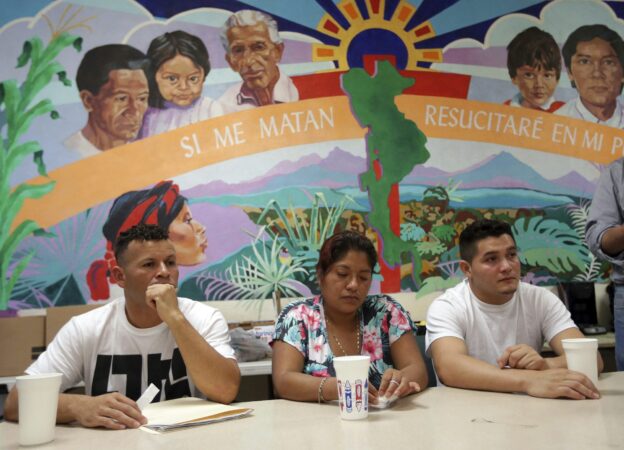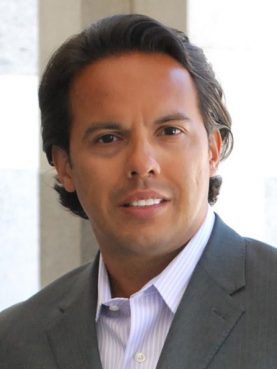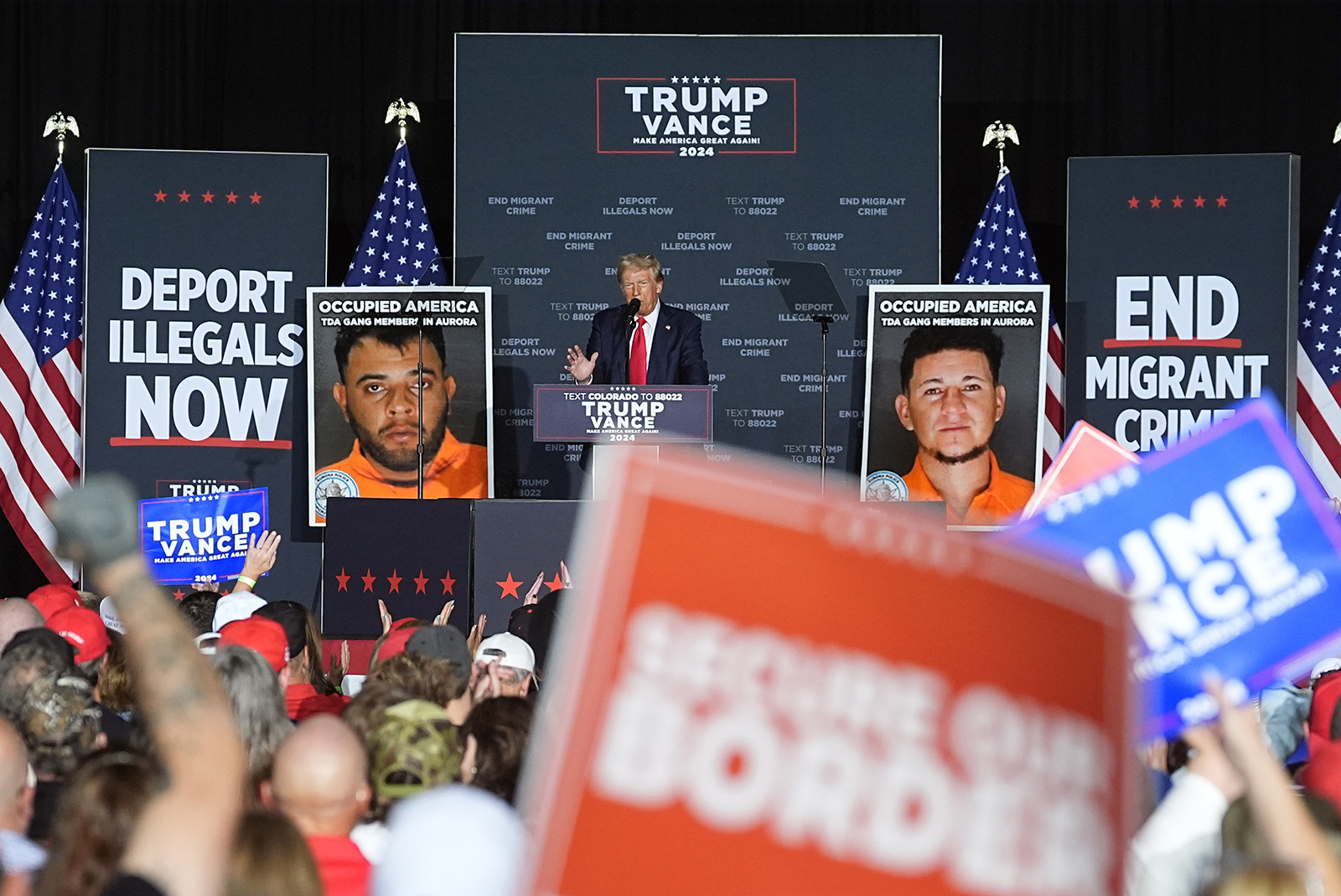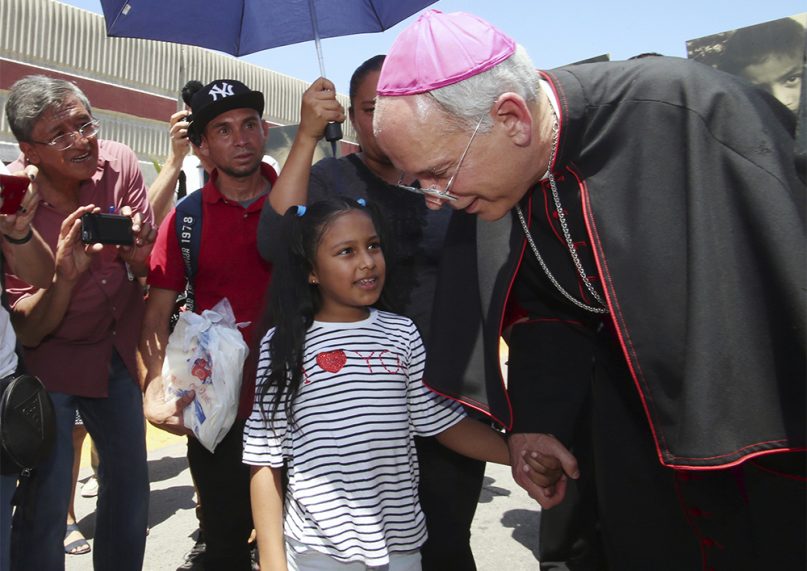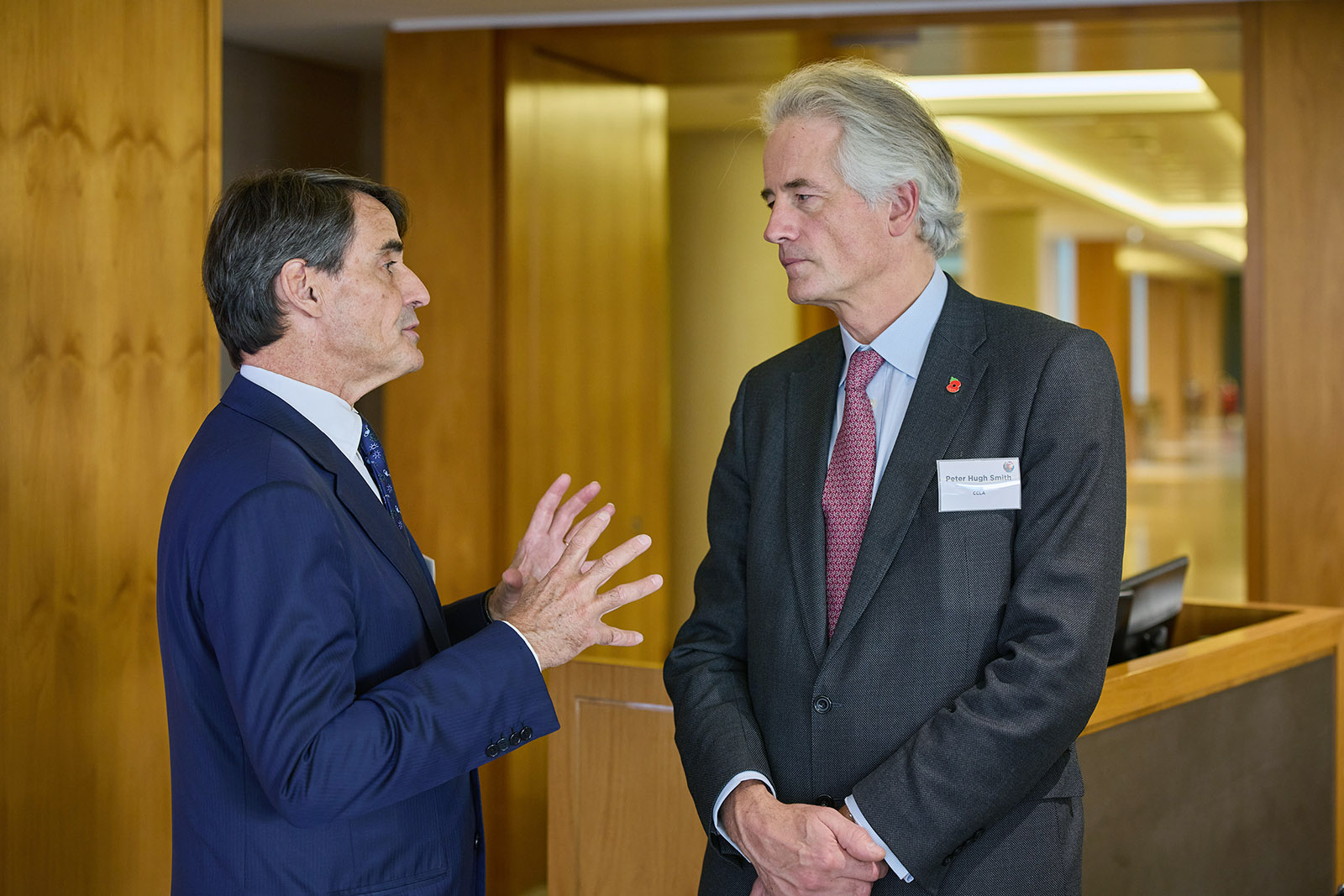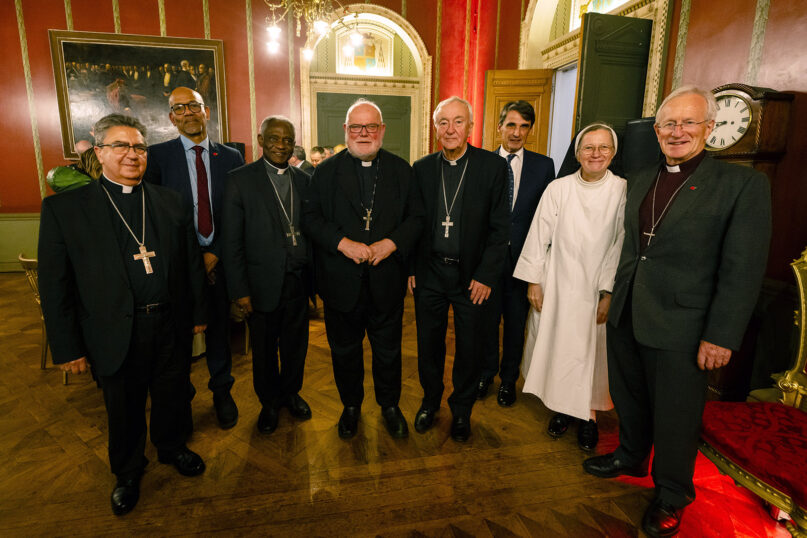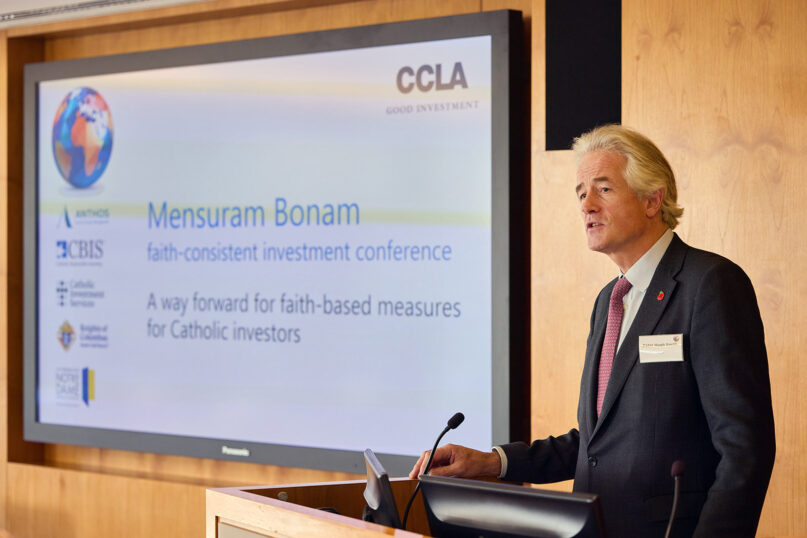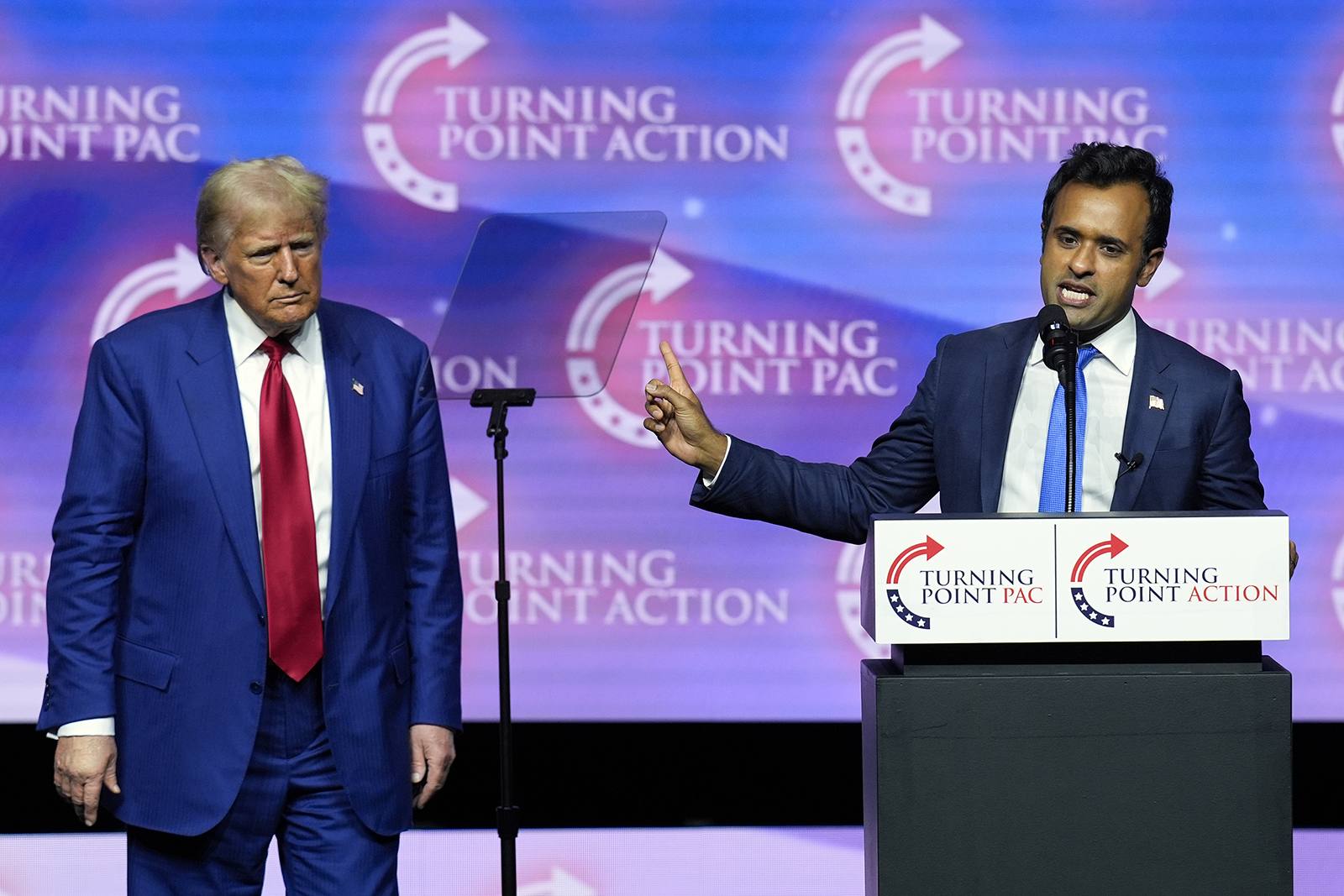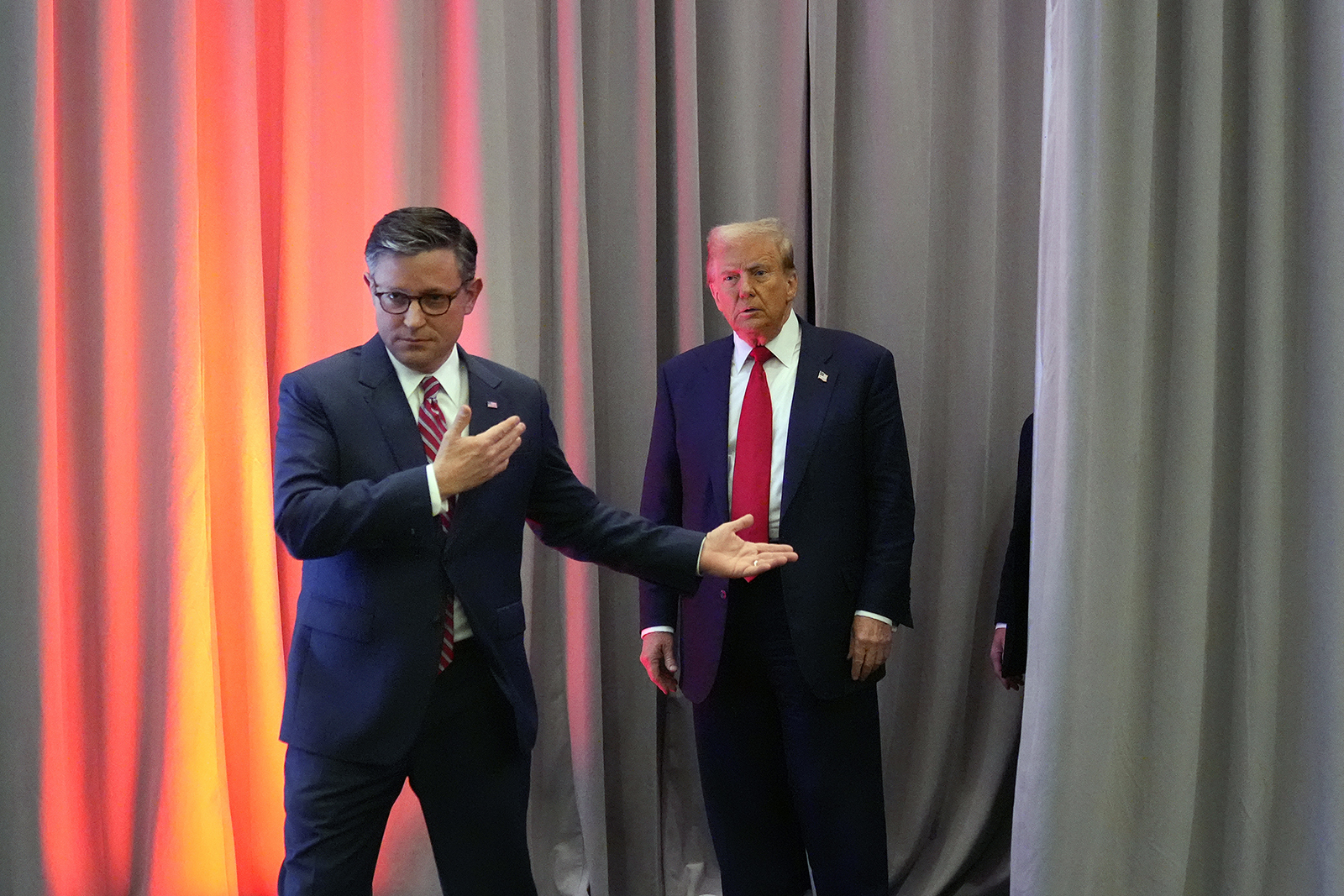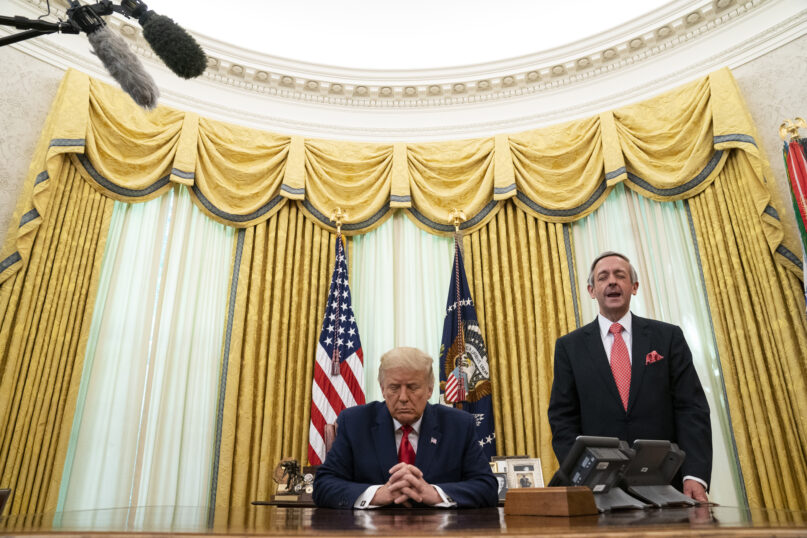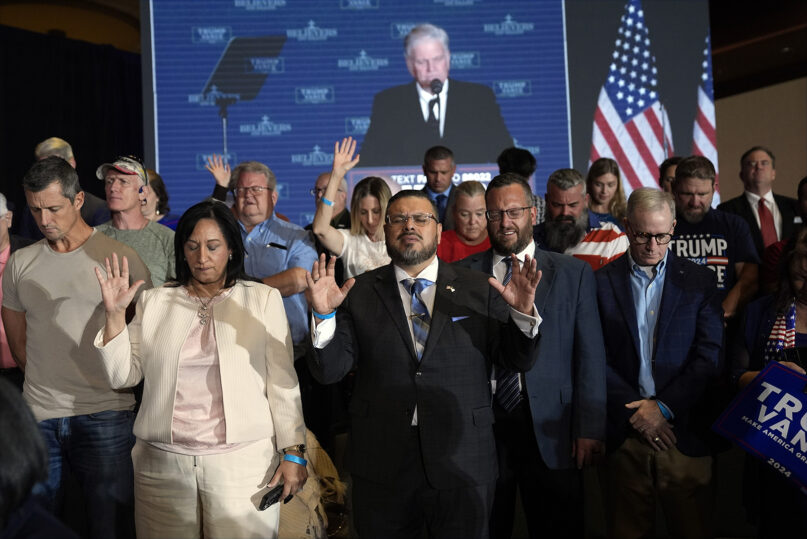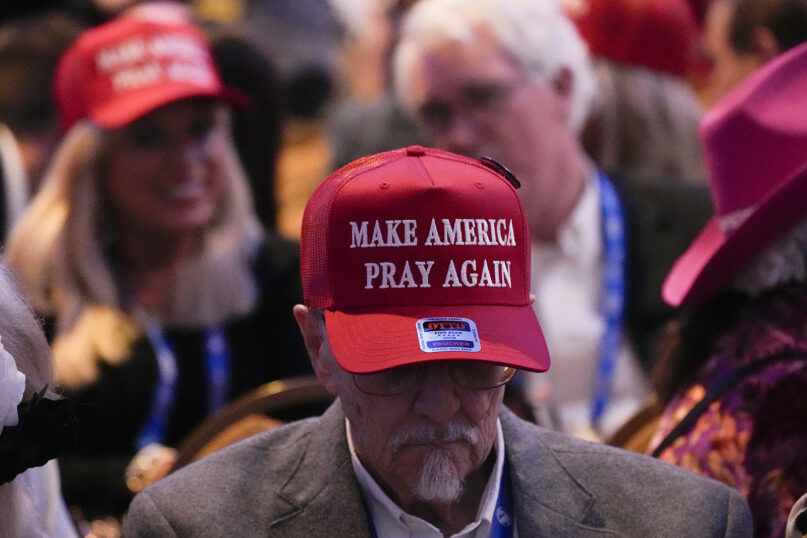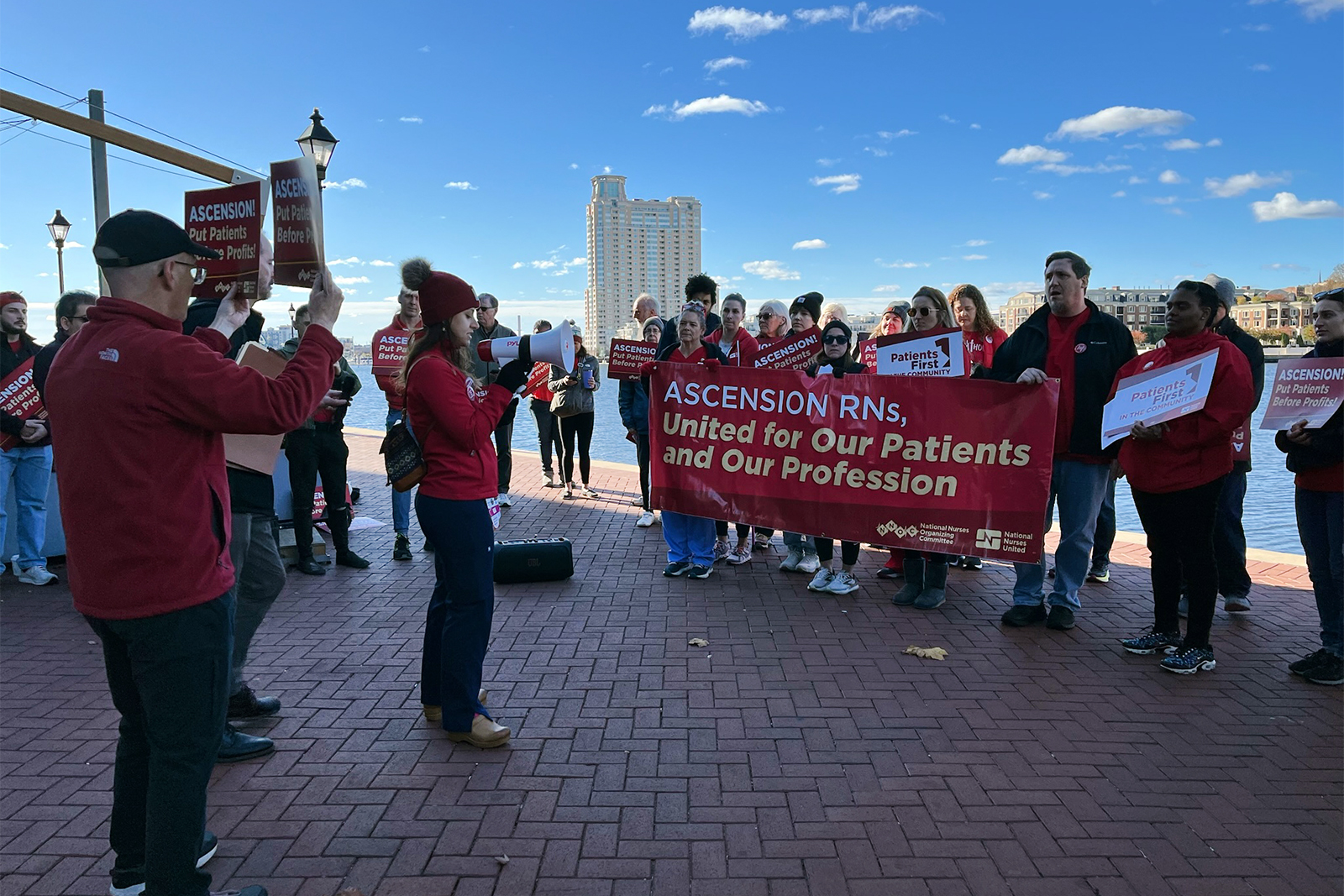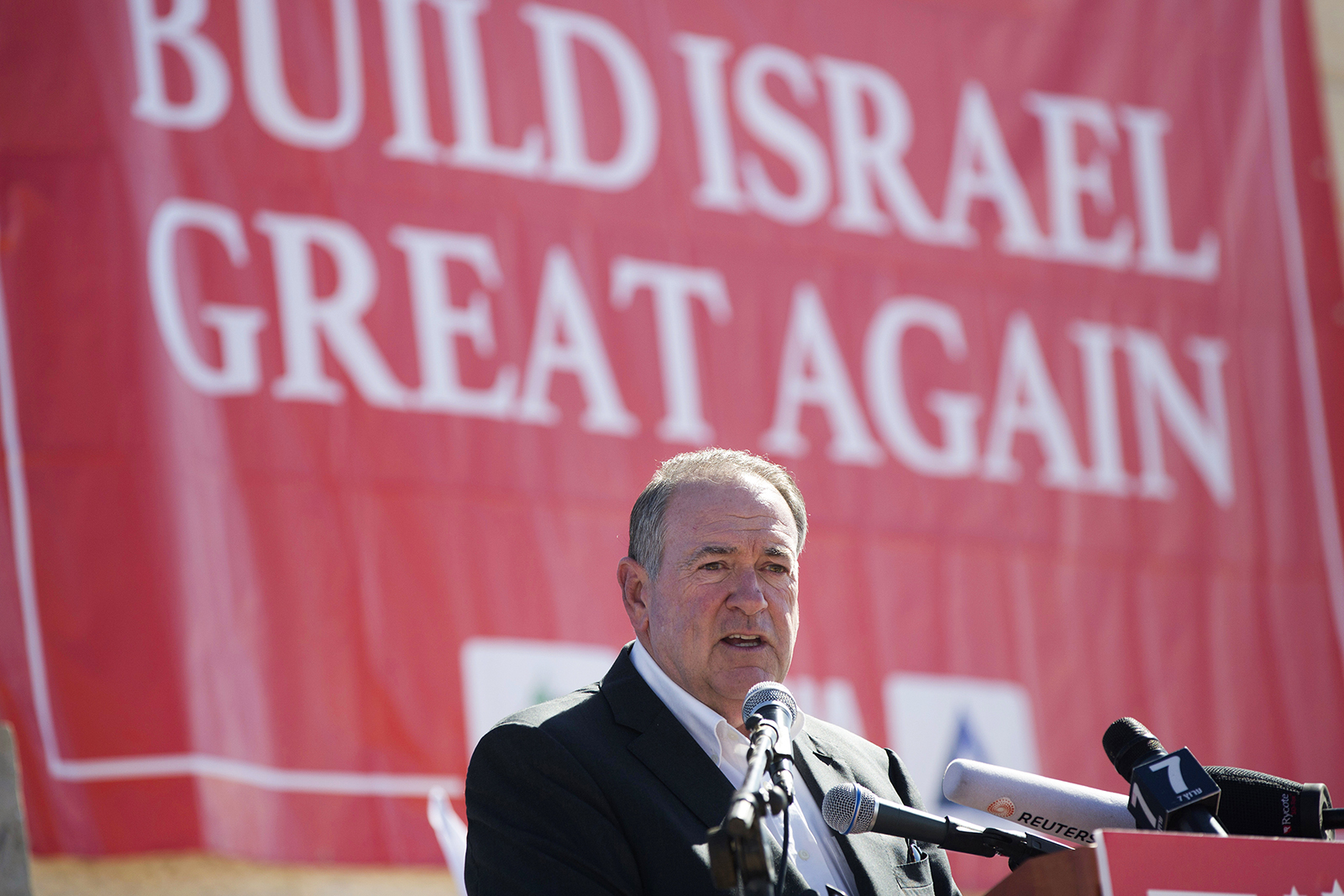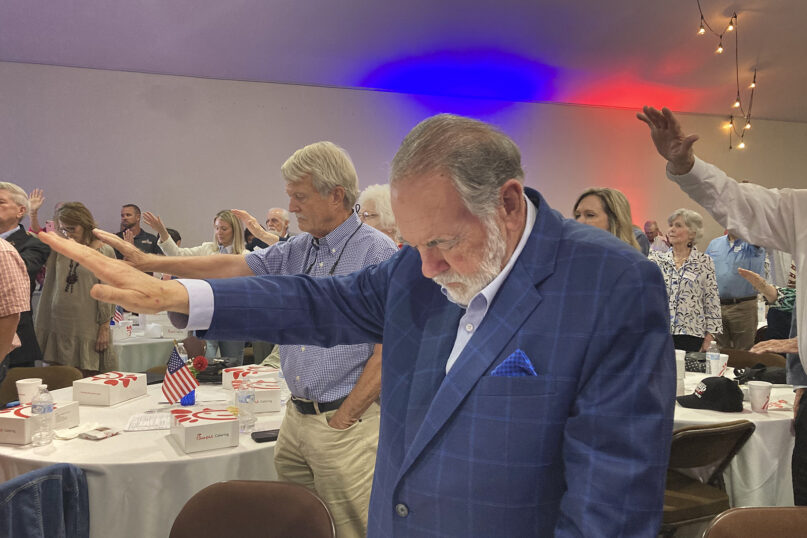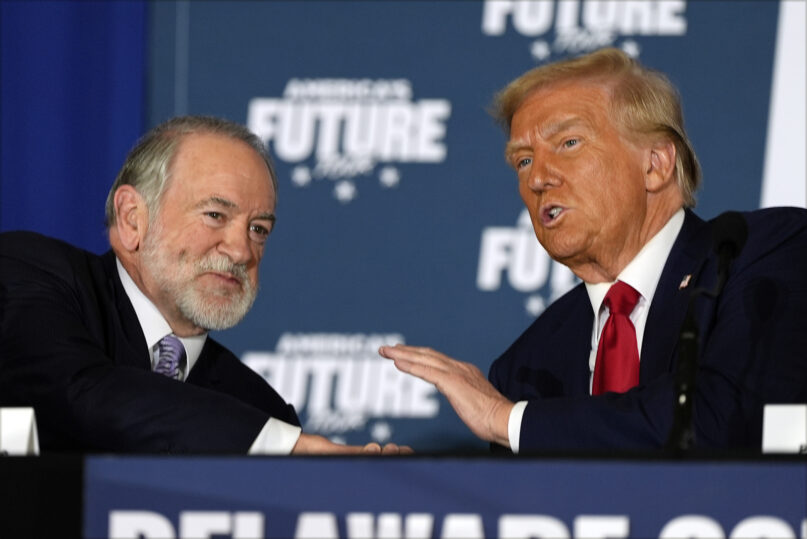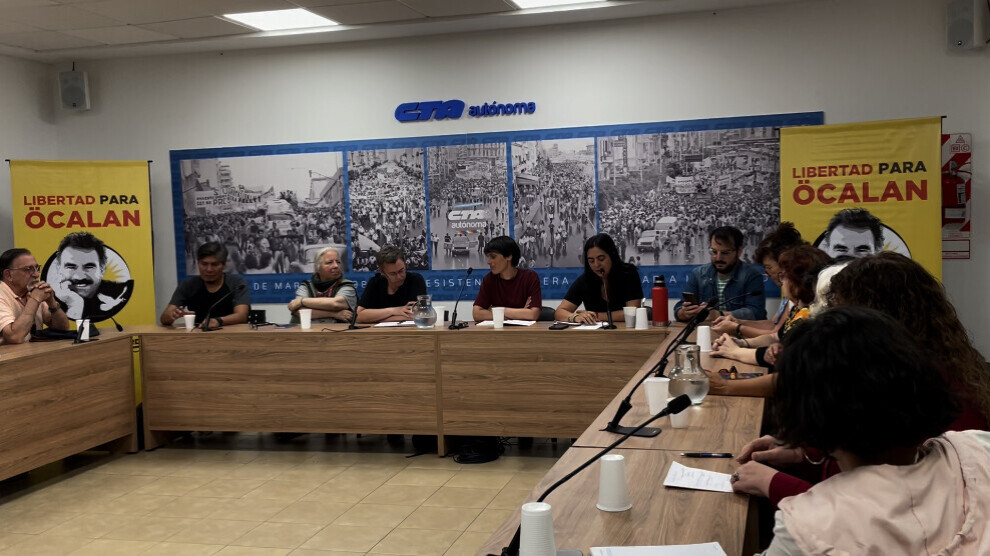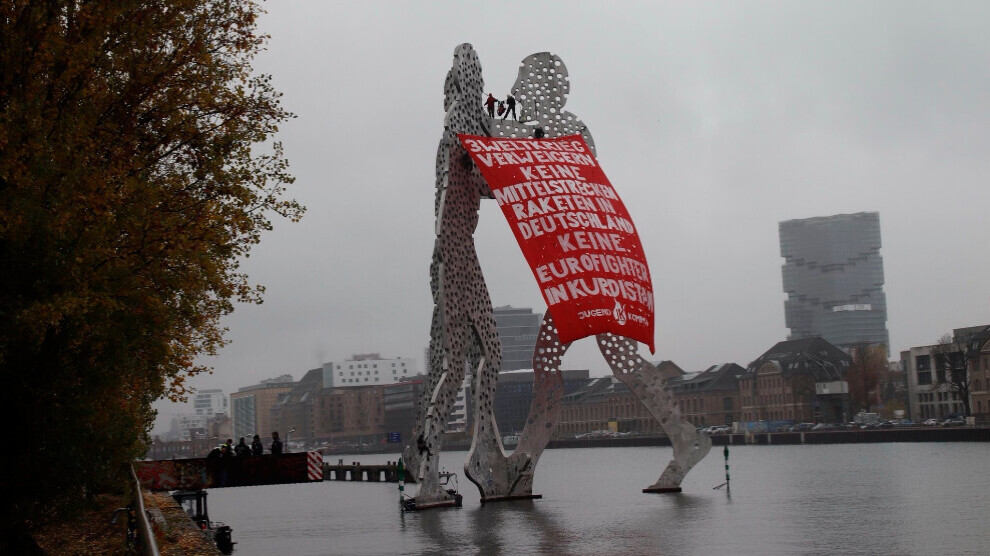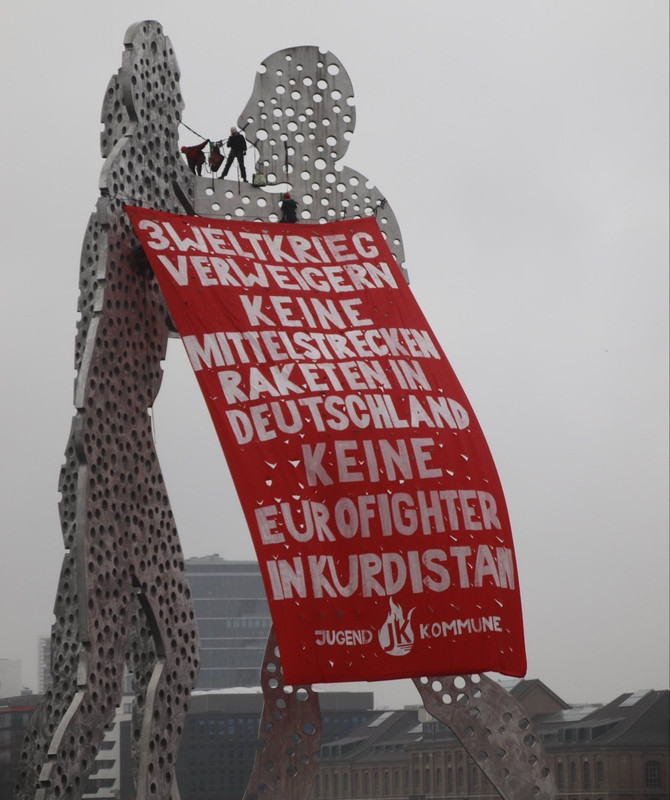(RNS) — When RNS reached out to the faith groups that have had a leading presence at recent COPs for comment on how they would approach their work given religious liberty violations, most were silent.
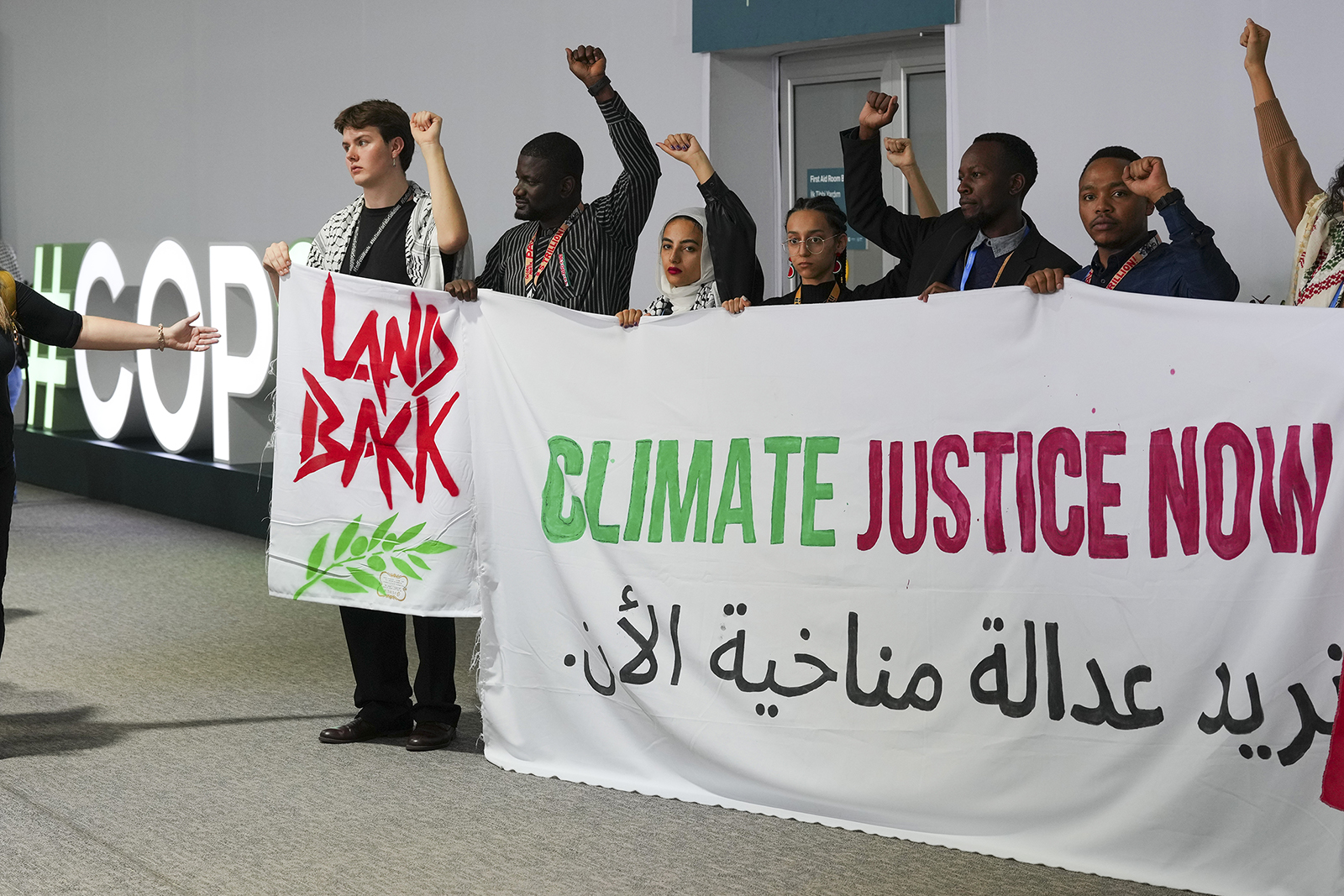
Activists demonstrate for climate justice and a cease-fire in the Israel-Hamas conflict at the COP29 U.N. Climate Summit, Monday, Nov. 11, 2024, in Baku, Azerbaijan.
(AP Photo/Peter Dejong)
Aleja Hertzler-McCain
November 11, 2024
(RNS) — Global leaders, diplomats and climate advocates are gathering to hammer out climate finance agreements at the latest U.N. climate summit being held today (Nov. 11) through Nov. 22 in Baku, Azerbaijan. But the host country for the annual summit has come under international scrutiny for human rights and religious freedom violations, leading some activists to question why there has not been more pushback from the global climate advocates, including faith organizations.
Days before COP29, the climate summit, began, the Azerbaijani government held a summit of religious leaders working on climate issues, calling itself “well-known for its traditions of tolerance, multicultural values and inter-civilizational and inter-religious cooperation,” even as outside observers have repeatedly raised concerns about religious freedom in the former Soviet country.
The government, led by President Ilham Aliyev, part of a family that has led the Muslim-majority country since 1993, requires religious groups to register with the government in order to operate legally. In the last two years, the number of religious activists who are being held as political prisoners has sharply increased, according to Azerbaijani watchdog Institute for Peace and Democracy, part of a broader escalation of a campaign of repression that has also led to the arrests of journalists and other opposition figures.
The country, funded in large part by fossil fuel revenues, has strengthened its army and recently carried out what the European Parliament called an “ethnic cleansing” of the breakaway region of Nagorno-Karabakh, which though internationally recognized as part of Azerbaijan, had been governed by ethnic Armenians since the fall of the Soviet Union. Armenians, who trace their heritage to the establishment of the oldest Christian nation, have called attention to Azerbaijani destruction of their religious sites in the region, even as the Azerbaijani government has said Armenians have destroyed Azerbaijani religious sites.
These concerns helped Azerbaijan land on the U.S. Commission of International Religious Freedom’s 2024 “countries of particular concern” list, its designation for governments that engage in or tolerate “particularly severe” violations of religious freedom.
But when RNS reached out to the faith groups that have had a leading presence at recent COPs for comment on how they would approach their work given these concerns over religious liberty, most were silent.

Azerbaijan, red, is located at the boundary of Eastern Europe and Western Asia.
(Map courtesy Wikimedia/Creative Commons)
Of the core team of faith groups organizing faith activities at the last COP, the World Evangelical Alliance, the Episcopal Diocese of California and the Muslim Council of Elders, none responded to requests for comment.
(After this story was published, the Episcopal Church issued a press release saying it “seeks to balance the urgency of climate change with concerns about ongoing human rights violations in Azerbaijan,” and noting that its government relations office sent an action alert urging Episcopalians to ask their congressional representatives to vote for the Supporting Armenians Against Azerbaijani Aggression Act of 2023.)
The Interfaith Center for Sustainable Development and the Partnership on Religion and Sustainable Development declined to respond to requests for comment, with PaRD citing its small team and limited resources. Several other faith groups that took secondary roles also did not respond.
The Rev. John Pawlikowski, a professor emeritus of social ethics at Catholic Theological Union, said that in the months leading up to the U.S. election, “there’s a fear right now on the part of some in the religious community to publicly criticize the COP” because it might encourage now President-elect Donald Trump to pull out of the process.
The Servite priest, also a member of the climate action task force of the Parliament of the World’s Religions, said he knew of religious actors who had boycotted previous COPs where there were limits on what participants could say about local human rights and intended to boycott the summit in Azerbaijan. Nonetheless, he said the majority believe in continuing with some level of involvement.
As a formal party to the U.N. Framework Convention on Climate Change, the Vatican, Pawlikowski said, “could raise the human rights issues more strongly and the religious liberty issues more strongly than it has.”
However, Pawlikowski said that the religious groups that participate in the COPs are not ignoring religious liberty but simply making a strategic decision not to pursue the issue during COP.
For some of the religious groups impacted by the Azerbaijani government’s repression, the silence of faith groups attending COP29 is a bitter betrayal.
Of the core team of faith groups organizing faith activities at the last COP, the World Evangelical Alliance, the Episcopal Diocese of California and the Muslim Council of Elders, none responded to requests for comment.
(After this story was published, the Episcopal Church issued a press release saying it “seeks to balance the urgency of climate change with concerns about ongoing human rights violations in Azerbaijan,” and noting that its government relations office sent an action alert urging Episcopalians to ask their congressional representatives to vote for the Supporting Armenians Against Azerbaijani Aggression Act of 2023.)
The Interfaith Center for Sustainable Development and the Partnership on Religion and Sustainable Development declined to respond to requests for comment, with PaRD citing its small team and limited resources. Several other faith groups that took secondary roles also did not respond.
The Rev. John Pawlikowski, a professor emeritus of social ethics at Catholic Theological Union, said that in the months leading up to the U.S. election, “there’s a fear right now on the part of some in the religious community to publicly criticize the COP” because it might encourage now President-elect Donald Trump to pull out of the process.
The Servite priest, also a member of the climate action task force of the Parliament of the World’s Religions, said he knew of religious actors who had boycotted previous COPs where there were limits on what participants could say about local human rights and intended to boycott the summit in Azerbaijan. Nonetheless, he said the majority believe in continuing with some level of involvement.
As a formal party to the U.N. Framework Convention on Climate Change, the Vatican, Pawlikowski said, “could raise the human rights issues more strongly and the religious liberty issues more strongly than it has.”
However, Pawlikowski said that the religious groups that participate in the COPs are not ignoring religious liberty but simply making a strategic decision not to pursue the issue during COP.
For some of the religious groups impacted by the Azerbaijani government’s repression, the silence of faith groups attending COP29 is a bitter betrayal.
“When something is happening to the first Christian nation in the world, they don’t care,” said Arshak Makichyan, an ethnic Armenian climate activist who lost his Russian citizenship after speaking out against the war in Ukraine. The Armenian Apostolic Christian, who said his faith sustains his activism, is an icon of the Russian climate movement because of his solo protests as part of Greta Thunberg’s Fridays for Future movement and his arrest in Russia for those protests after attending COP25 in 2019.
“What is happening to Armenians is really terrible and we need international solidarity,” he said, warning he worries that Azerbaijan will be emboldened to go to war with Armenia.
The activist sees Armenian issues as a natural part of the COP discussion of Indigenous issues. “If you have been colonized by Western countries, then it is colonization, but if you were colonized by Turkey or Azerbaijan, then it’s not colonization,” he said of Western people’s ignorance of Armenian history, which included centuries of Ottoman control and repression before between 600,000 and 1. 5 million Armenians were killed by the Ottoman Empire during World War I, in what is widely considered a genocide.
Makichyan had planned to go back to COP this year, but he said Azerbaijan denied his visa, even after he said the United Nations had approved his accreditation for the event.

Mukhtar Babayev, COP29 president, speaks during an opening plenary session at the COP29 U.N. Climate Summit, Monday, Nov. 11, 2024, in Baku, Azerbaijan.
(AP Photo/Peter Dejong)
The U.S. embassy of Azerbaijan and the U.N. Framework Convention of Climate Change offices did not respond to RNS’ requests for comment on the denial of Makichyan’s visa.
Makichyan explained, “I think it’s really important to raise the Armenian issue at the conference,” saying he was motivated to go “even though my grandfather’s uncle was killed in Baku, and though my grandparents, they were deported from Nakhchivan,” part of modern-day Azerbaijan.
Makichyan is part of a group calling for the international community at COP29 to demand the release of Armenian and other political prisoners held by the Azerbaijani government, sanctions, the right of return for “Artsakh Armenians to Indigenous lands,” an end to anti-Armenian destruction of cultural heritage and propaganda and divestment from Azerbaijani oil, in addition to a commitment to cease holding COPs in countries with political prisoners.
Azerbaijan has dismissed international concerns about religious freedom in the country as holding pro-Armenian bias.
Kamal Gasimov, a researcher on Islam in Azerbaijan who is currently visiting assistant professor of Arabic at Swarthmore College in Pennsylvania, said the USCIRF report should have cited third-party sources instead of relying on Armenian scholars to write about Armenian monuments.
Gasimov said the USCIRF report is a “political document,” which is indicative of relationships between Azerbaijan and the U.S. Some Azeris see the document as evidence of U.S. imperialism, while others whose family members are imprisoned are grateful for it, he said.
Mohamed Elsanousi, a commissioner who joined USCIRF after the most recent report’s deliberation process had been completed, said, “Our aim here is not really to blame and shame countries. Our aim is to improve religious freedom.”
USCIRF is made up of appointees by the U.S. president and congressional leaders. A minority of four dissented the Azerbaijan decision, expressing concerns that the country should be given a less severe designation for its religious freedom violations.
Despite controversy over the report, Gasimov said the Azerbaijani government plays a significant role regulating religion in the Muslim-majority country, adapting an approach from the Soviet Union that is common across post-Soviet countries.
“If you are a registered religious community within the state institution, the state gives you a passport, then you exist. If the state refuses your registration, then you don’t exist,” he said.
The goal is “making Islam part of the state bureaucracy, which makes Islam predictable,” as well as “easily observed” and “controlled.” They also accomplish this by “controlling books” and “trying to co-opt the religious leaders, charismatic leaders, (by) offering them jobs in the government.”
The U.S. embassy of Azerbaijan and the U.N. Framework Convention of Climate Change offices did not respond to RNS’ requests for comment on the denial of Makichyan’s visa.
Makichyan explained, “I think it’s really important to raise the Armenian issue at the conference,” saying he was motivated to go “even though my grandfather’s uncle was killed in Baku, and though my grandparents, they were deported from Nakhchivan,” part of modern-day Azerbaijan.
Makichyan is part of a group calling for the international community at COP29 to demand the release of Armenian and other political prisoners held by the Azerbaijani government, sanctions, the right of return for “Artsakh Armenians to Indigenous lands,” an end to anti-Armenian destruction of cultural heritage and propaganda and divestment from Azerbaijani oil, in addition to a commitment to cease holding COPs in countries with political prisoners.
Azerbaijan has dismissed international concerns about religious freedom in the country as holding pro-Armenian bias.
Kamal Gasimov, a researcher on Islam in Azerbaijan who is currently visiting assistant professor of Arabic at Swarthmore College in Pennsylvania, said the USCIRF report should have cited third-party sources instead of relying on Armenian scholars to write about Armenian monuments.
Gasimov said the USCIRF report is a “political document,” which is indicative of relationships between Azerbaijan and the U.S. Some Azeris see the document as evidence of U.S. imperialism, while others whose family members are imprisoned are grateful for it, he said.
Mohamed Elsanousi, a commissioner who joined USCIRF after the most recent report’s deliberation process had been completed, said, “Our aim here is not really to blame and shame countries. Our aim is to improve religious freedom.”
USCIRF is made up of appointees by the U.S. president and congressional leaders. A minority of four dissented the Azerbaijan decision, expressing concerns that the country should be given a less severe designation for its religious freedom violations.
Despite controversy over the report, Gasimov said the Azerbaijani government plays a significant role regulating religion in the Muslim-majority country, adapting an approach from the Soviet Union that is common across post-Soviet countries.
“If you are a registered religious community within the state institution, the state gives you a passport, then you exist. If the state refuses your registration, then you don’t exist,” he said.
The goal is “making Islam part of the state bureaucracy, which makes Islam predictable,” as well as “easily observed” and “controlled.” They also accomplish this by “controlling books” and “trying to co-opt the religious leaders, charismatic leaders, (by) offering them jobs in the government.”
RELATED: USCIRF chair rebukes Azerbaijan for imprisoned Jehovah’s Witness conscientious objector
Other religious groups, like the Jehovah’s Witnesses, have not been able to register. Jehovah’s Witnesses also highlight that the state has not followed through on its stated exemptions to compulsory military service for conscientious objectors, with some believers experiencing beatings and legal sentences.
While USCIRF cites the 2009 Azerbaijani law requiring registration as a major source of the violation of international human rights standards, Gasimov said the Arab Spring protests motivated the government to double down on control in the name of preventing radicalization and legitimized those actions by juxtaposing “the security of Azerbaijan with what’s happening in the Middle East.”
Azerbaijani watchdog Institute for Peace and Democracy says that the majority of the 319 political prisoners in the Muslim-majority country are “peaceful believers,” coming in at 228, which includes members of the Muslim Unity Movement and other Muslim theologians. Before early 2023, the number of religious political prisoners had been below 100.
Elsanousi said USCIRF had some documentation that “law enforcement also utilized and threatened torture, sexual assaults, and other mistreatment toward non-conforming Shia Muslims in the state custody.”
The Muslim Unity Movement, a Shia group, gained popularity, according to Gasimov, by mixing their religious discourse with concerns about social issues, like bribery and police violence.
Makichyan said that Azerbaijan has previously used “greenwashing,” or a type of spin that portrays the country as an environmental protector, to get away with human rights violations, including against ethnic Armenians.
Looking forward, he emphasized the importance of religious pluralism. As a Christian who knows of genocides that Muslim Indigenous groups have lived through, “it’s really important to be against Islamophobia because we Armenians, hopefully we will be able to return to western Armenia also and try to coexist with other people,” he said.
This story has been updated.
